Politics on Screen: kino, czyli polityka
„Możesz nie interesować się polityką, ale polityka zawsze będzie interesować się tobą” – ta stara maksyma wybrzmiewa szczególnie mocno w gorącym roku wyborczym. Kampania prezydencka w Stanach Zjednoczonych zaczyna wkraczać w decydującą fazę, a jej finał (czyli same wybory) przypadnie dokładnie na dzień rozpoczęcia 15. American Film Festival. Trzymamy więc rękę na pulsie i we współpracy z Podkastem amerykańskim przygotowaliśmy wyjątkową sekcję Politics on Screen, w ramach której sprawdzimy, jak na przestrzeni lat kino z USA opisywało i komentowało rodzimą scenę polityczną.
Co znalazło się w programie sekcji? Jaki był klucz doboru tytułów? Oddajemy głos Łukaszowi Pawłowskiemu i Piotrowi Tarczyńskiemu – prowadzącym Podkast amerykański, kuratorom sekcji i autorom opisów filmów.
Samuel Goldwyn, jeden z założycieli Hollywood, zwykł mawiać, że jeśli ktoś ma jakąś wiadomość, to powinien używać telegramu, a nie kina. Film miał jakoby sztuką z natury apolityczną, służącą jedynie rozrywce. To oczywiście bzdura. Kultura popularna, a szczególnie kino, jest czymś znacznie więcej: miernikiem nastrojów społecznych; zwierciadłem, w którym odbijają się aktualne problemy kraju; wreszcie narzędziem politycznym.
Amerykańskie władze bardzo wcześnie zdały sobie sprawę z polityczności kina – w latach 40. XX wieku zamawiały antynazistowskie filmy akcji; w latach 50. każde hollywoodzkie studio wyprodukowało u siebie jakiś antykomunistyczny dramat. Federalne Biuro Śledcze już od lat 30. monitorowało kulturę popularną i to, jak przestawia ona agentów FBI; Pentagon wciąż ma swojego łącznika z przemysłem filmowym, który stara się, by amerykańska armia była przedstawiana tak, jak życzy sobie tego Departament Obrony.
W kinie ideologia jest wszędzie, a przekaz polityczny wszechobecny – silniejszy, słabszy, zamierzony lub nie. Polityczna jest Casablanca, polityczne są Gwiezdne wojny, Nashville, Forrest Gump czy Uciekaj!. A nawet Legalna blondynka.
Są jednak filmy, w których polityka amerykańska jest na pierwszym planie – opowiadają o Kongresie, kampaniach wyborczych, senatorach, kongresmenach i, rzecz jasna, prezydentach. I to właśnie one kształtują ramy politycznego myślenia, ale też – zupełnie praktycznie – dostarczają widzom „wiedzy” na temat tego, jak w praktyce działa polityka. Wielu Amerykanów (i jeszcze więcej nie-Amerykanów) swoje wyobrażenie na temat praktyki systemu politycznego USA czerpie właśnie z kultury popularnej.
Kilka z tych filmów chcemy Państwu pokazać w sekcji Politics on Screen, którą Podkast amerykański przygotował dla tegorocznej edycji American Film Festival. Pokazujemy zarówno filmy nieoczywiste (Twarz w tłumie Elii Kazana, Sieć Sidneya Lumeta), nieco zapomniane (Ten najlepszy Franklina Schaffnera czy Chwała w ukryciu Roberta Altmana), a wreszcie takie, które z jakichś powodów szczególnie lubimy: Przeżyliśmy wojnę Johna Frankenheimera (na którą nalegał Piotr) oraz Fakty i akty (na których zależało Łukaszowi).
Tak się składa, że tegoroczny AFF zacznie się w chwili, gdy końca dobiegnie fascynująca, bezprecedensowa kampania wyborcza. 5 listopada miliony Amerykanów wybiorą swoich przedstawicieli – na czele z prezydentem lub prezydentką. Ucieszeni lub rozczarowani, zadowoleni z rezultatu wyborów albo nim przerażeni, obejrzyjcie z nami kilka świetnych filmów o amerykańskiej polityce.
Łukasz Pawłowski i Piotr Tarczyński
Podkast amerykański
Twarz w tłumie (A Face in the Crowd), reż. Elia Kazan, USA 1957
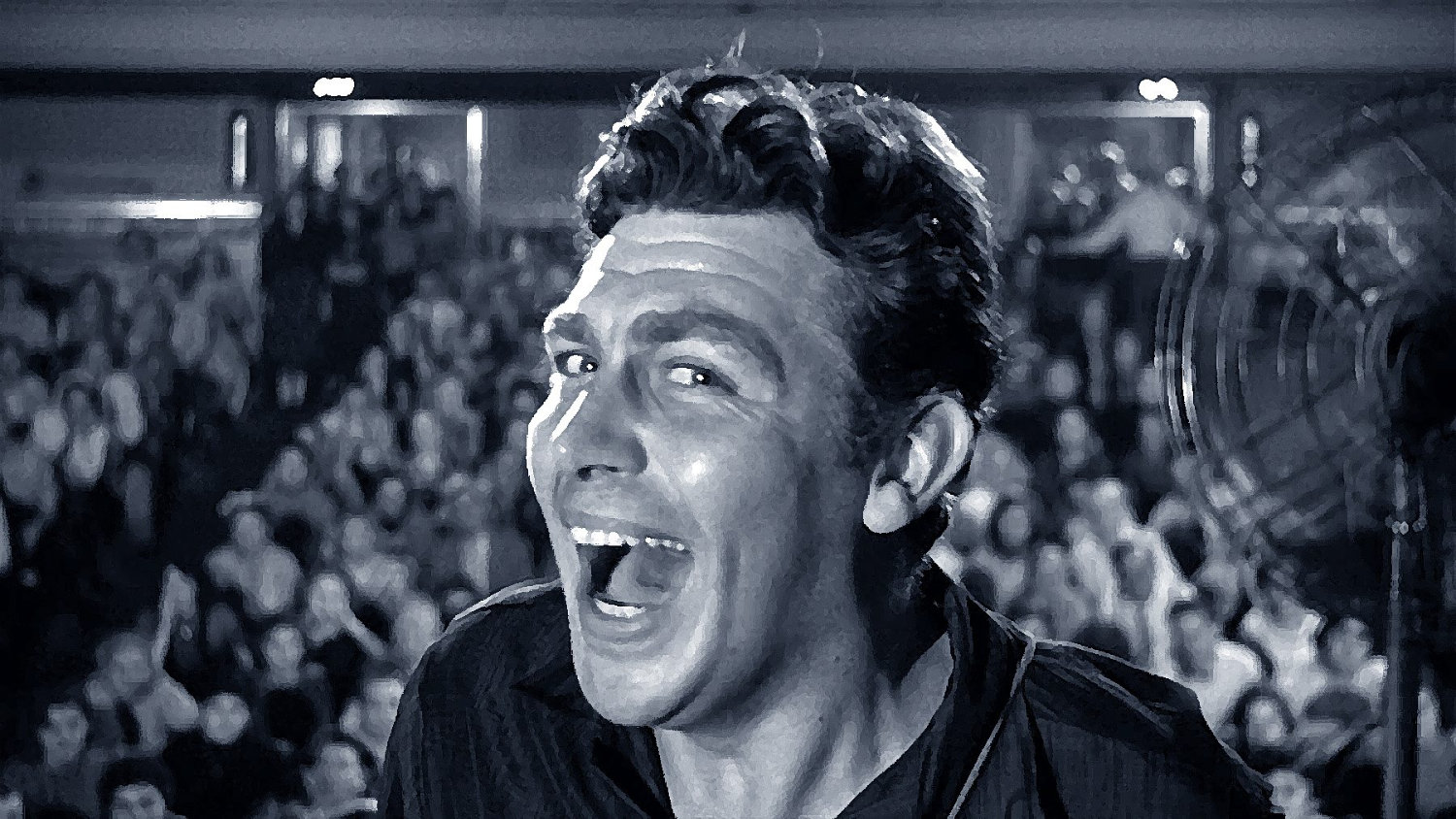
Lokalna dziennikarka radiowa ze stanu Arkansas, Marcia Jeffries, prowadzi program Twarz w tłumie, w którym podtyka mikrofon pod nos zwykłym Amerykanom. W odcinku nagrywanym z aresztu bohaterem zostaje pijaczek, włóczęga i grajek Larry Rhodes. W zamian za obietnicę skrócenia kilkudniowego wyroku podśpiewuje i dzieli się anegdotkami z życia włóczęgi. Program podoba się tak bardzo, że Jeffries namawia Rhodesa – któremu nadaje przydomek „Samotnik” (Lonesome) – na stałą audycję. Popularność Samotnika rośnie – do radia płyną listy i podarunki. A kiedy Rhodes żartem zachęca słuchaczy, by zrobili psikusa szeryfowi nagle odkrywa, że wraz z popularnością przychodzi władza. Z lokalnej stacji przenosi się do telewizji, a liczba fanów zaczyna być liczona w milionach. Rhodesa kuszą reklamodawcy, którymi niegdyś się brzydził i politycy, którym kiedyś nie ufał. Upojony popularnością wierzy, że może osiągnąć wszystko – nawet stworzyć zwycięskiego kandydata na prezydenta. Sukces jest na wyciągnięcie ręki…
Łukasz Pawłowski
Przeżyliśmy wojnę (The Manchurian Candidate), reż. John Frankenheimer, USA 1962
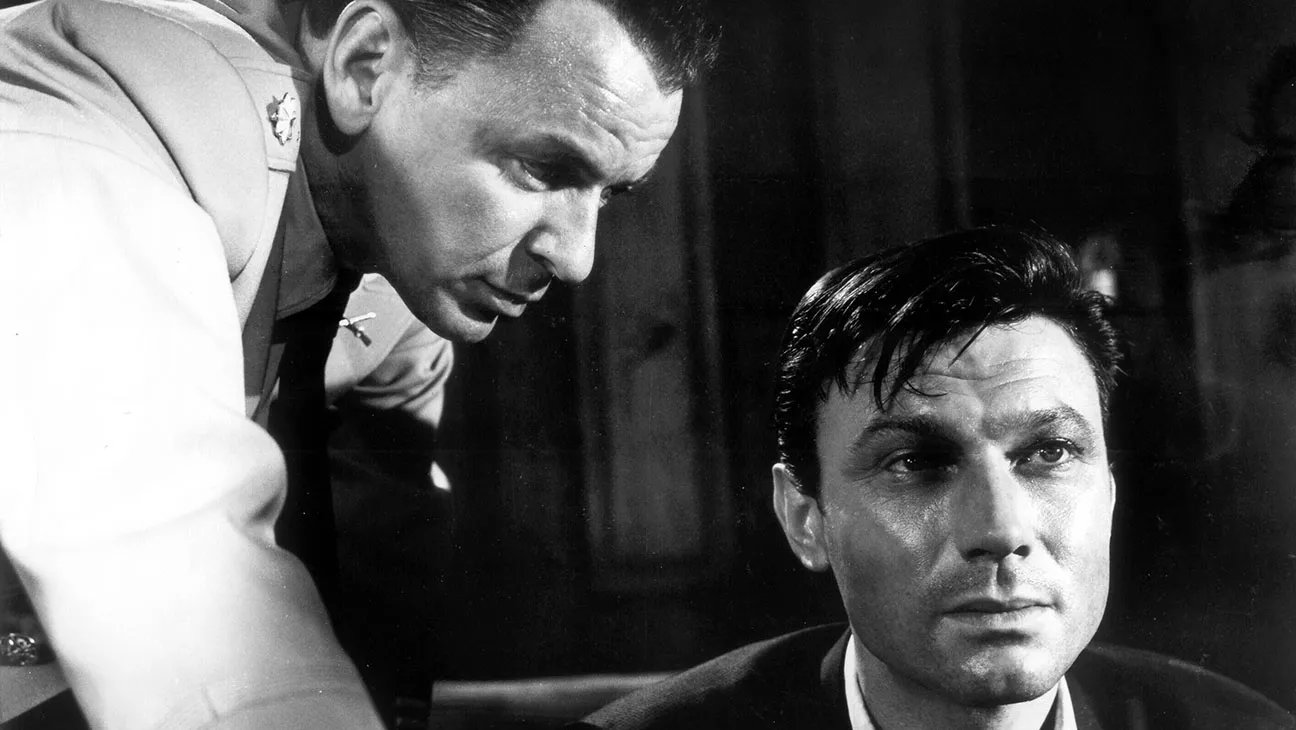
Weteran wojny w Korei, kapitan Marco (Sinatra), wraca do ogarniętych antykomunistyczną paranoją Stanów Zjednoczonych, gdzie nic nie jest takie, jak się wydaje na pierwszy rzut oka. Czy jego odznaczony medalem za odwagę kolega z wojska, sierżant Shaw (Harvey) faktycznie jest bohaterem? Co tak naprawdę wydarzyło się podczas wojny w Mandżurii? Komu służy ojczym Shawa, zawzięcie tropiący „czerwonych” senator Iselin i jaką rolę odgrywa w tym wszystkim jego żona, matka Shawa, Eleanor Iselin (Lansbury)? Wreszcie: co oznaczają tajemnicze sny kapitana Marco – i czy na pewno to tylko wytwory jego wyobraźni?
Arcydzieło thrillera paranoicznego w którym lęk przed komunistycznym spiskiem łączy się z lękiem przed fanatyzmem makkartyzmu i „polowań na czerwonych”. Wybory prezydenckie, zabójstwa polityczne, a do tego doskonała, niezapomniana rola Angeli Lansbury. Film, który po zabójstwie prezydenta Johna F. Kennedy’ego, wycofano z dystrybucji na ponad ćwierć wieku.
Piotr Tarczyński
Ten najlepszy (The Best Man), reż. Franklin J. Schaffner, USA 1964
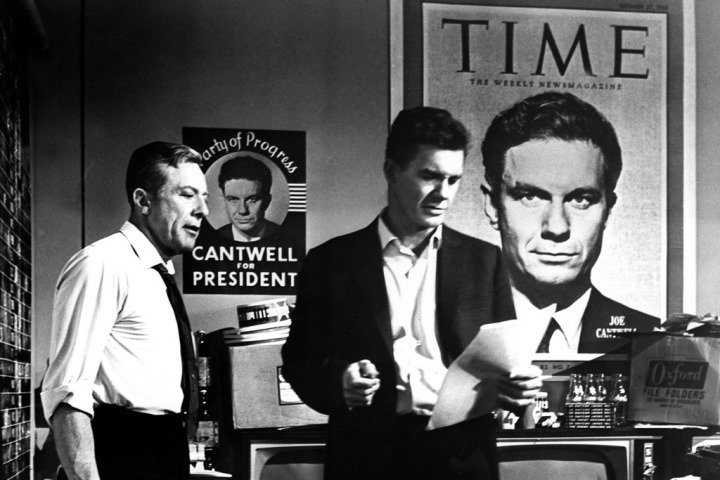
Jeden z pierwszych amerykańskich filmów political fiction z prawdziwego zdarzenia, adaptacja broadwayowskiej sztuki Gore’a Vidala, gdzie o rolę jednego z kandydatów ubiegał się Ronald Reagan, ale uznano, że aktor… „nie wygląda wystarczająco prezydencko”.
Konwencja przedwyborcza bezimiennej partii politycznej przymierza się do wybrania swojego kandydata na prezydenta. O nominację ubiegają się dwaj bardzo różni politycy: były sekretarz stanu William Russell (Fonda) oraz senator Joe Cantwell (Robertson). Pierwszy jest intelektualistą, drugi bezwzględnym populistą wzorowanym na Richardzie Nixonie. Kogo poprze umierający prezydent (Tracy)? Kto jest „tym najlepszym”? Odpowiedź na to pytanie wcale nie jest taka oczywista. Czy w polityce cel uświęca środki?
Do tego zaskakujący wątek gejowski – Ten najlepszy to pierwszy mainstreamowy film w którym pojawia się słowo „homoseksualista”.
Piotr Tarczyński
Sieć (Network), reż. Sidney Lumet, USA 1976
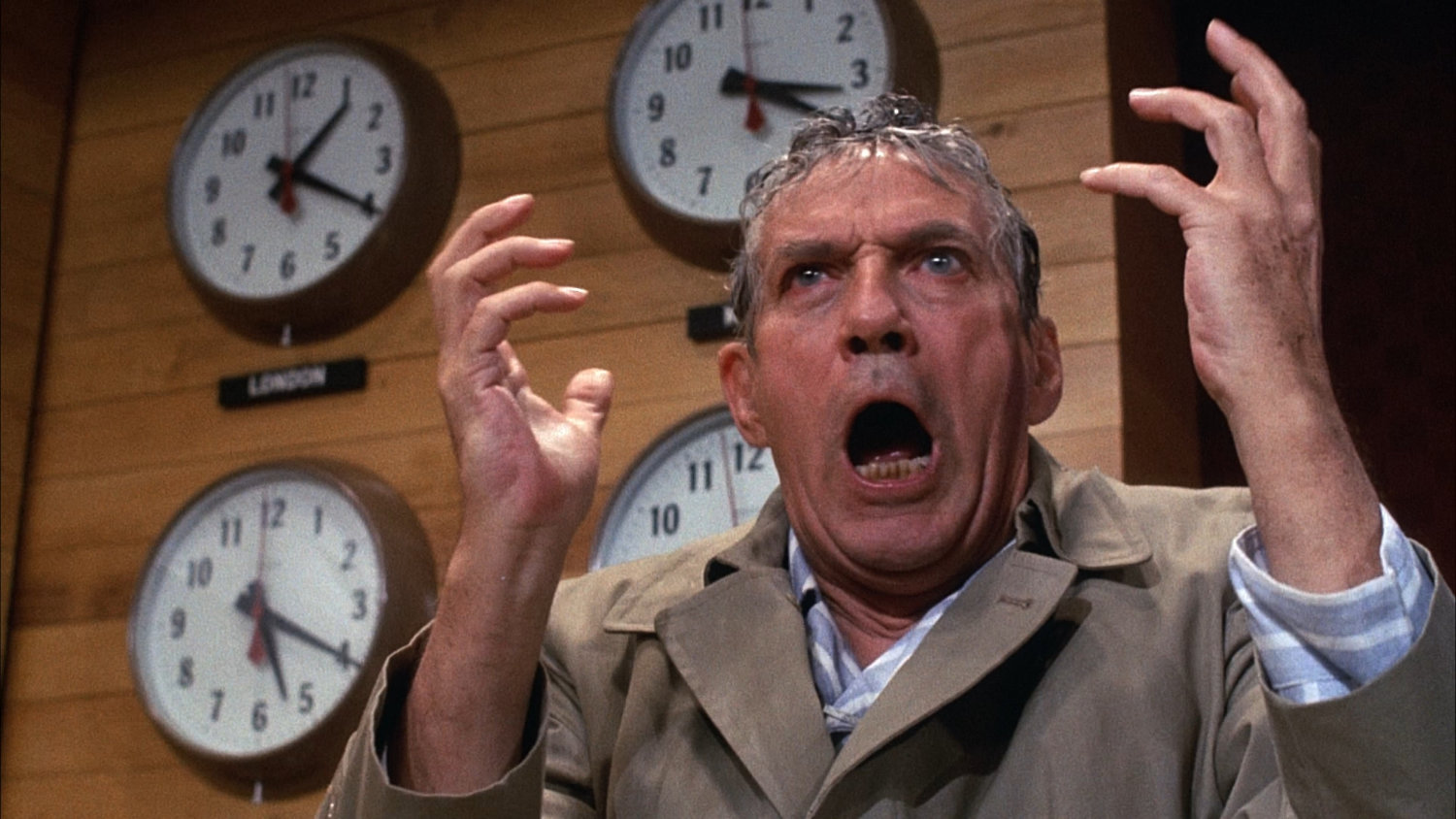
Na pierwszy rzut oka Sieć może nie wydawać się filmem politycznym – nie ma tu prezydentów, senatorów, wszystko toczy się w studiach wielkiej stacji telewizyjnej. Szybko jednak okazuje się, że wszystko jest polityczne – w tym gniew. Kiedy zwolniony prezenter Howard Beale (Finch) ogłasza na antenie zamiar popełnienia samobójstwa, bezlitosna szefowa programu (Dunaway) postanawia zrobić z tego hit ramówki. „Zwykły, gniewny człowiek”, pomstujący na wszystko wokół, staje się głosem wszystkich Amerykanów, którzy „są wściekli jak diabli i nie zamierzają już znosić tego dłużej”. Obraz paranoicznej, depresyjnej Ameryki lat 70., wyczerpanej wojną w Wietnamie i aferą Watergate i prorocza satyra na przemysł telewizyjny, który nawet z autentycznego, populistycznego gniewu jest w stanie zrobić produkt.
Film, który zdobył m.in. trzy Oskary w kategoriach aktorskich oraz Oskara za scenariusz – jeden z dziesięciu najlepszych w historii, według Związku Zawodowego Scenarzystów.
Piotr Tarczyński
Chwała w ukryciu (Secret Honor), reż. Robert Altman, USA 1984
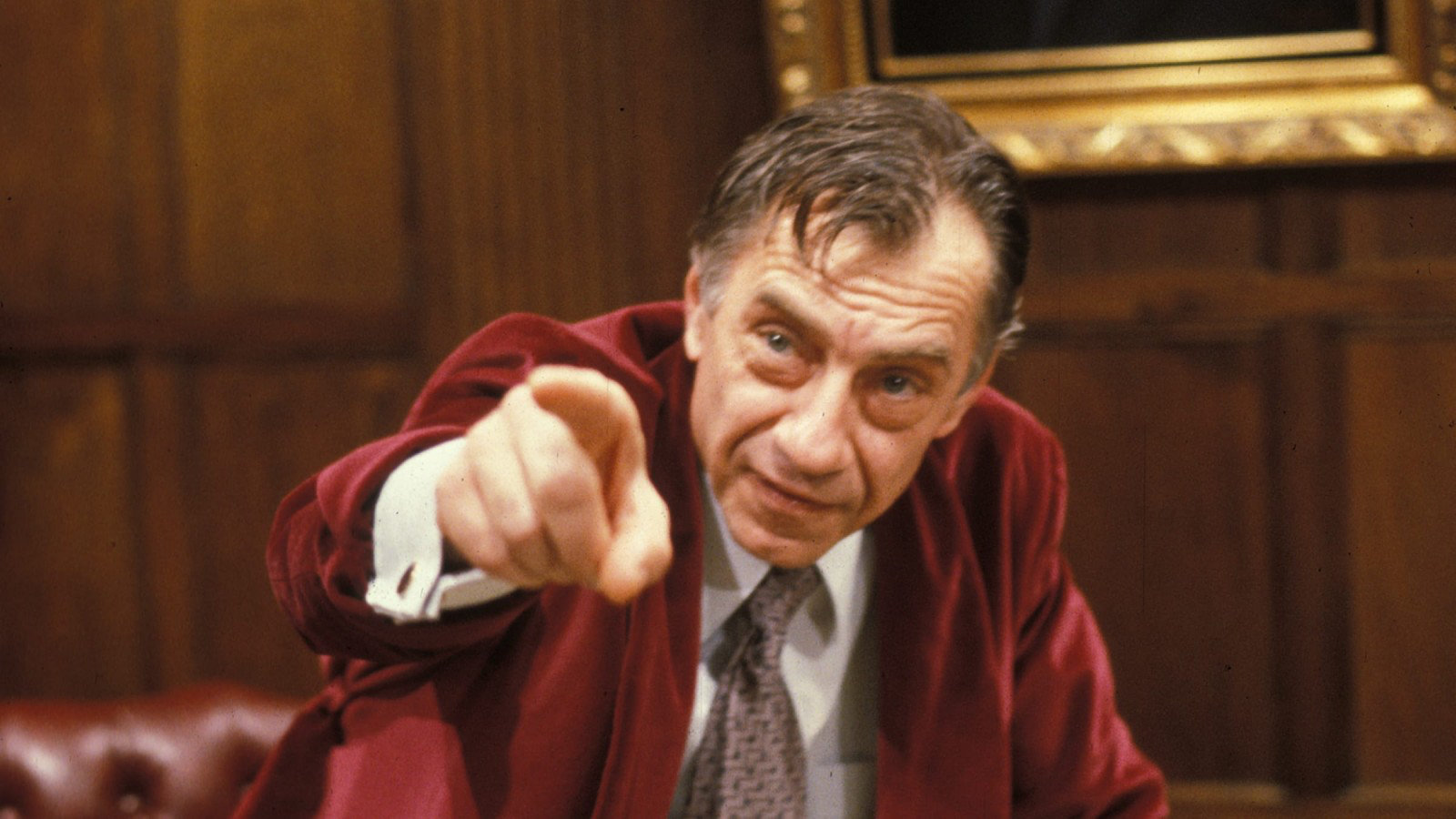
Przedziwny film i to nie tylko dlatego, że Robert Altman, mistrz wielkich filmów z liczną obsadą, daje nam tym razem kameralny monodram rozgrywający się w jednym wnętrzu, nakręcony w ramach szkoły reżyserii na Uniwersytecie Michigan z pomocą studentów.
Były prezydent Richard Nixon (Philip Baker Hall, który wcześniej grał tę rolę na deskach teatru) – z butelką szkockiej whisky i pistoletem w ręku – miota się w swoim gabinecie, nagrywając na taśmę przemyślenia na temat swojej prezydentury. Pomstuje na Kennedy’ego, Kissingera i dziennikarzy, użala się nad sobą, rozpamiętuje krzywdy, wpada to w furię, to w rozpacz, próbuje się wytłumaczyć przed samym sobą i przed nami, widzami/słuchaczami. Kto był tajemniczym Głębokim Gardłem, które ujawniło dziennikarzom „Washington Post” prawdę na temat afery Watergate i doprowadziło do rezygnacji Nixona ze stanowiska? Teorie spiskowe przeplatają się tu z faktami, Nixon-złoczyńca z Nixonem-ofiarą, a my dostajemy mistrzowską rolę Philipa Bakera Halla.
Piotr Tarczyński
Fakty i akty (Wag the Dog), reż. Barry Levinson, USA 1997
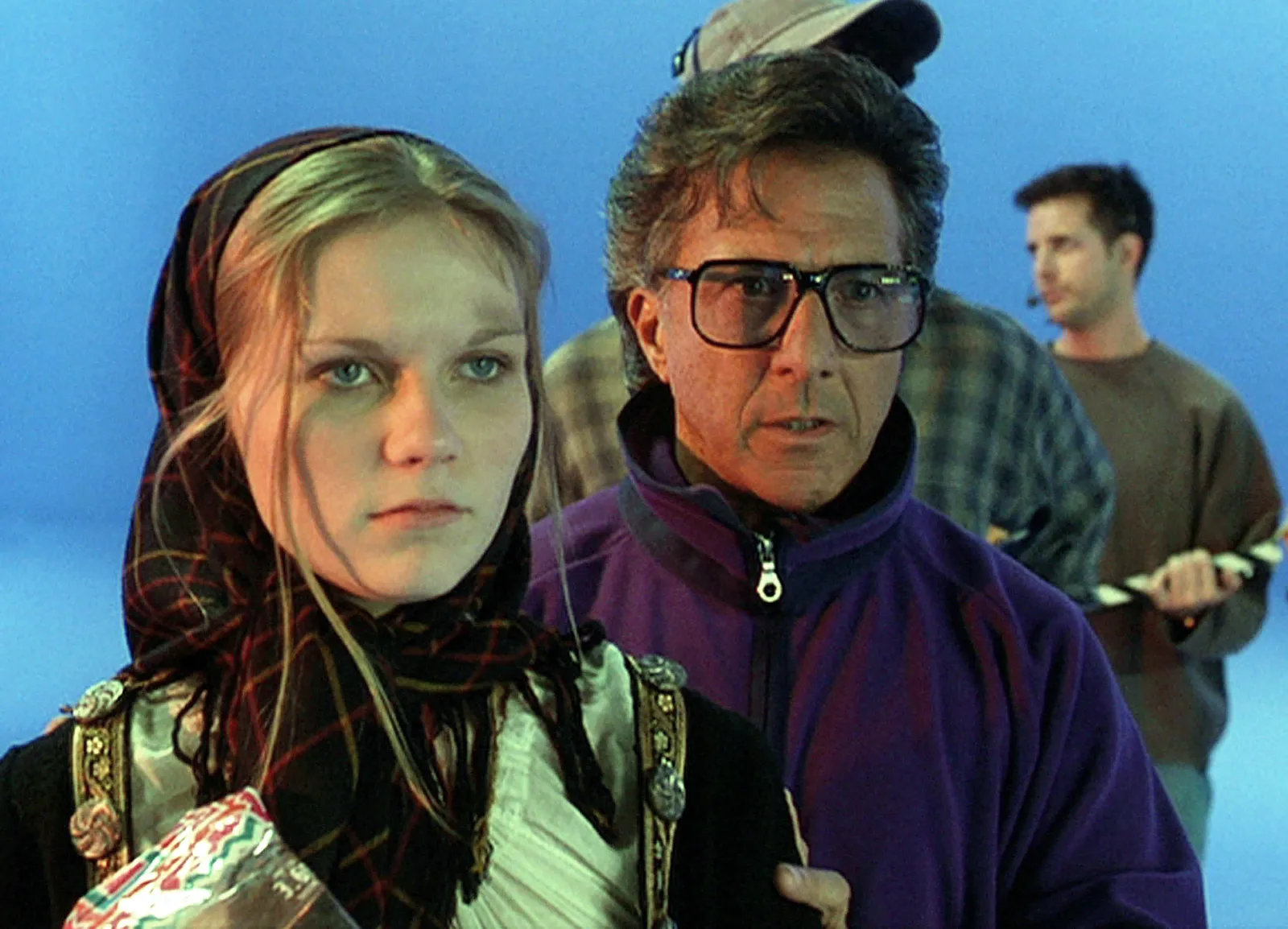
Na kilkanaście dni przed wyborami ubiegający się o reelekcję prezydent zostaje oskarżony o napastowanie nieletniej harcerki podczas wizyty harcerzy w Białym Domu. Do akcji wkracza Conrad Brean (Robert De Niro) – spin doctor, czyli zawodowy zaklinacz opinii publicznej. Zadanie ma jasne – ma sprawić, by przez niespełna dwa tygodnie Amerykanie zapomnieli o skandalu. Ale jak zatuszować taką aferę? „Tu potrzeba by wojny”, mówi Stanley Motss (Dustin Hoffman), znany hollywoodzki producent filmowy, do którego Brean zwraca się z prośbą o pomoc. Ma rację. Motts ma pomóc w przekonaniu obywateli, że ich prezydent został zmuszony do wypowiedzenia wojny Albanii. Dlaczego Albanii? Bo co przeciętny Amerykanin wie o Albanii i w sumie, dlaczego nie? Aby akcja wyglądała wiarygodnie potrzebne będą dramatyczne nagrania z frontu, wdzięczni mieszkańcy, a nawet zostawiony za linią frontu skromny amerykański żołnierz.
Filmowi Levinsona można zarzucić, że jest rysowany zbyt grubą kreską. Ale fantastyczna gra duetu De Niro/Hoffman, znakomite wstawki muzyczne i doskonały czarny humor sprawiają, że wszelkie uwagi schodzą na drugi plan. W końcu jesteśmy w stanie wojny!
Łukasz Pawłowski
Partnerem sekcji Politics on Screen jest Filmoteka Narodowa – Instytut Audiowizualny.


